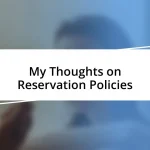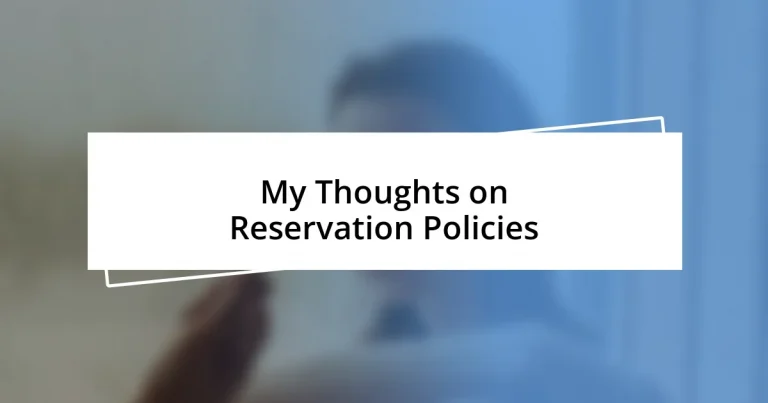Key takeaways:
- Reservation policies play a crucial role in managing resources, promoting fairness, and empowering marginalized communities.
- Successful implementation of reservation policies can lead to increased diversity, innovation, and improved access to opportunities for underrepresented groups.
- Community participation and understanding are essential for addressing challenges and reducing tensions surrounding reservation policies.
- Personal narratives highlight the transformative impact of reservation policies on individuals and their communities, emphasizing the importance of equity and opportunity.
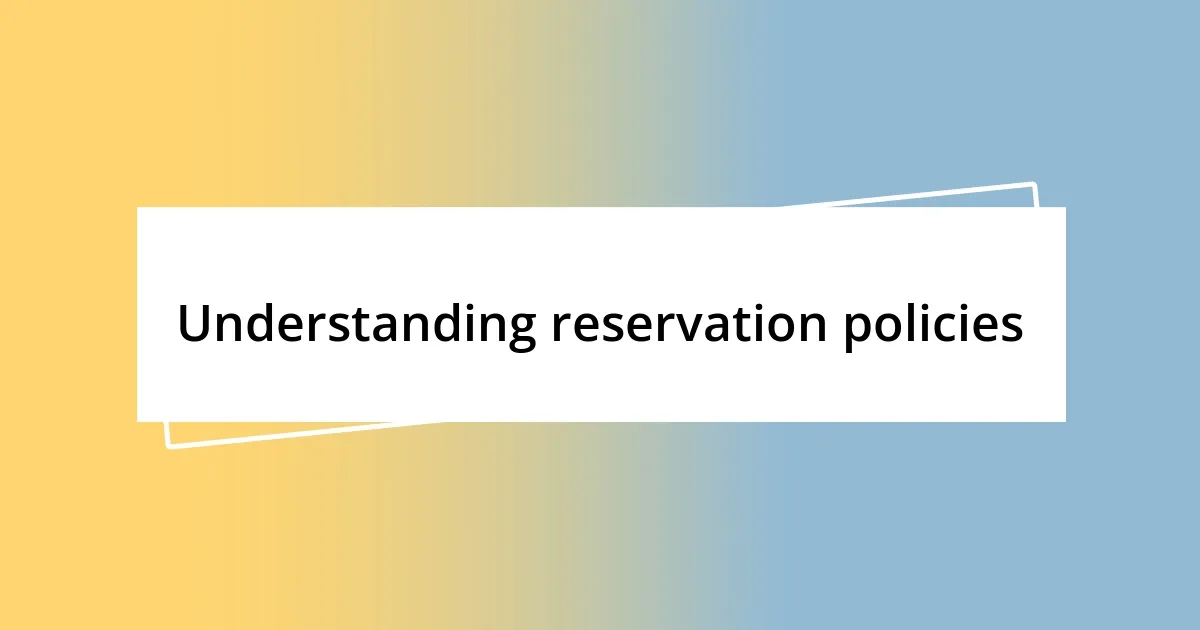
Understanding reservation policies
Reservation policies can often feel complicated, but they serve a crucial role in managing resources and ensuring fairness. I remember a time when I was trying to book a last-minute hotel room during a busy convention weekend. The frustration of fully booked hotels made me appreciate the policies that prioritize various groups, like locals or those with special needs. How often do we take these rules for granted until we feel the crunch ourselves?
When we delve deeper, it’s fascinating to see how these policies can differ widely across industries. For instance, in healthcare, reservation policies help manage patient flow and prioritize urgent needs. Reflecting on my own experiences, I’ve seen how these protocols can sometimes create tension, especially when one person feels overlooked. It’s a delicate balance, isn’t it?
Understanding these policies requires empathy and consideration of the various perspectives involved. I often ask myself, “How would I feel if I were on the receiving end?” This kind of reflection can help us appreciate the purpose behind reservation systems, fostering greater understanding and cooperation in our communities.
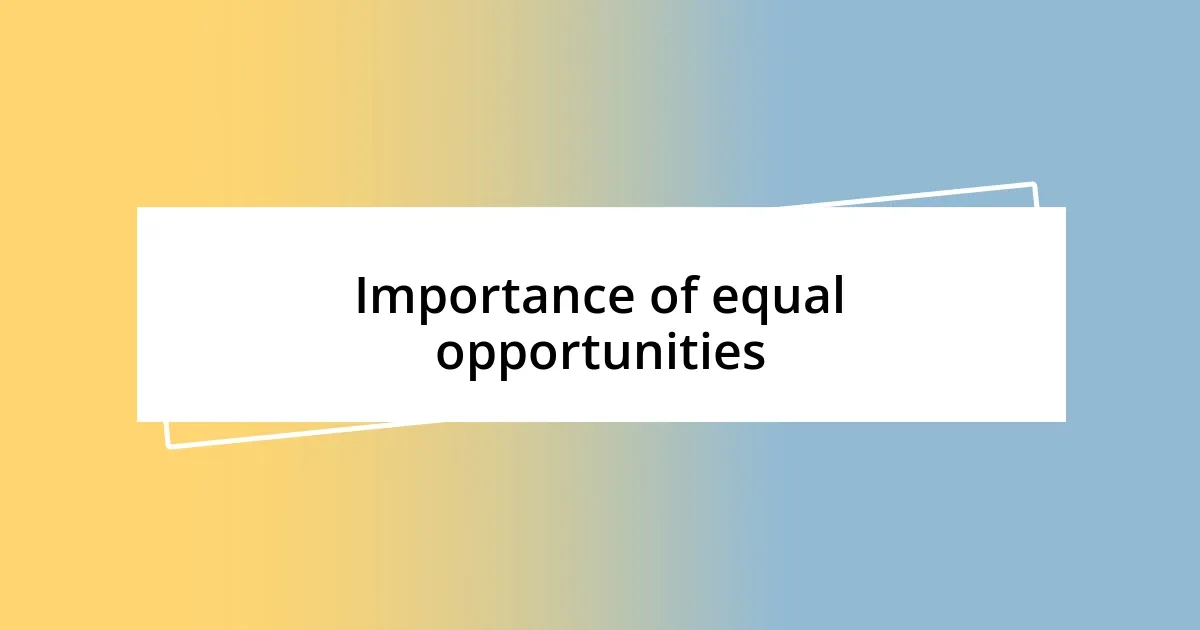
Importance of equal opportunities
Equal opportunities are fundamental to building inclusive societies. I once attended a community event where different perspectives were highlighted, and it was eye-opening to witness how equal opportunities can uplift marginalized voices. It’s like a symphony—every instrument plays a crucial role, and when everyone has a chance, the harmony is truly beautiful.
When we observe workplaces that prioritize equal opportunities, it’s compelling to see the benefits firsthand. I remember interacting with a colleague who had a disability; their innovative ideas transformed our project. Experiences like that reinforce my belief that diversity drives creativity, and everyone deserves a fair shot, regardless of their background.
Lack of equal opportunities can lead to a cycle of disadvantage that’s hard to break. I recall a friend who struggled in her educational journey because she didn’t have access to the same resources as others. It made me realize that ensuring equity is not just about policies; it’s about human lives, aspirations, and creating pathways for success.
| Unsecured Group | Secured Group |
|---|---|
| Limited Access | Enhanced Access |
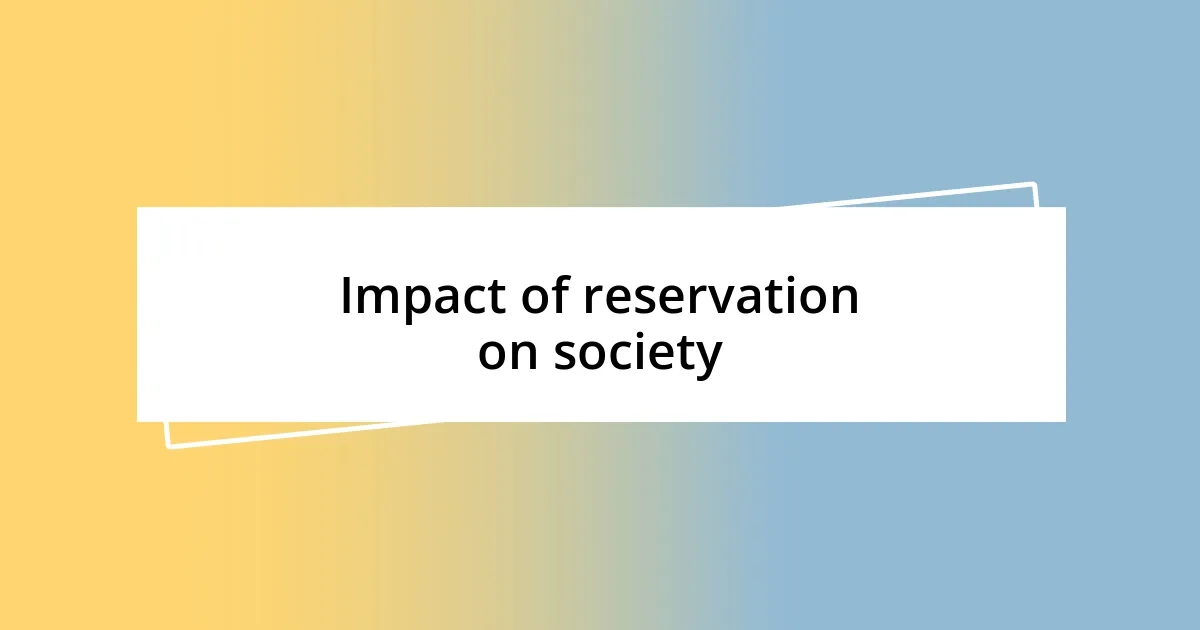
Impact of reservation on society
The impact of reservation policies on society is profound and multifaceted. I’ve been part of discussions where the emotional weight of these policies became palpable. For example, during a volunteer effort at a local shelter, I met individuals who had benefitted from reservation systems in education and employment. Hearing their stories made it clear how these initiatives can change lives, offering a sense of hope and opportunity that many had been denied otherwise.
Additionally, it’s essential to recognize the challenges that come with implementing these policies. Some individuals might feel resentment or frustration, believing their opportunities are being compromised. However, it’s crucial to understand that these feelings often stem from a fear of change rather than an actual loss. The benefits can be vast, leading to a more inclusive society where everyone feels they belong. Here are some key impacts I’ve reflected on regarding reservation policies:
- Empowerment of marginalized communities: Reservation policies provide historically underserved groups with better access to education and employment, enabling social mobility.
- Promotion of diversity: By diversifying workplaces and educational settings, these policies foster varied perspectives, enriching discussions and driving innovation.
- Potential for societal tension: While many benefit, some may feel disadvantaged, leading to misunderstanding and conflict that society must address with open dialogue and education.
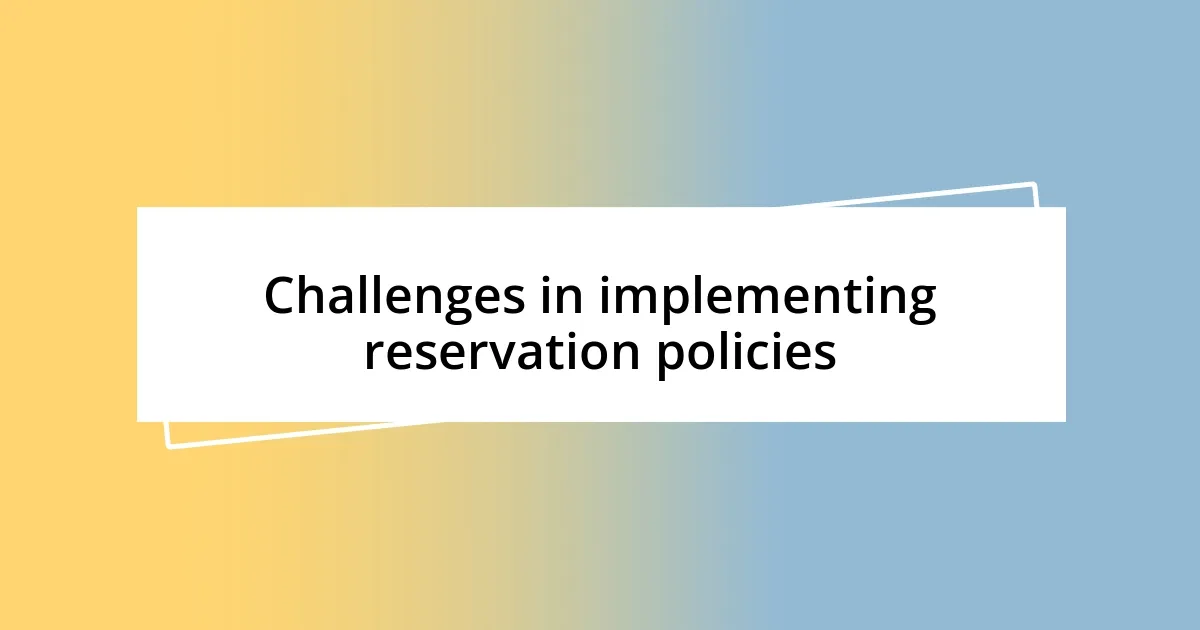
Challenges in implementing reservation policies
Implementing reservation policies often encounters significant resistance, which can create tension in communities. I remember a heated debate during a town hall meeting about a proposed policy in our school district. Some attendees passionately argued that reservations were unfair, expressing frustration that their children might miss out on opportunities. This made me realize how deeply personal these issues can feel for people, and it highlighted the need for empathy and understanding in these discussions.
Another challenge stems from the administrative burden these policies can impose. I once volunteered for a nonprofit that helped families navigate educational resources, and I saw firsthand how complex it was to allocate resources equitably. The constant need for data, evaluation, and adjustment meant that dedicated staff spent a lot of time untangling bureaucratic red tape rather than directly assisting those in need. How can we balance the best intentions with the practical realities of execution?
Then there’s the issue of awareness and education about the policies themselves. I recall speaking with a neighbor who was totally unaware of how reservation policies were designed to level the playing field. It struck me that many people might hold misconceptions simply due to a lack of information. Addressing these gaps through community outreach and workshops could foster more inclusive dialogue, helping everyone understand that the ultimate aim is to create a fairer society for all.
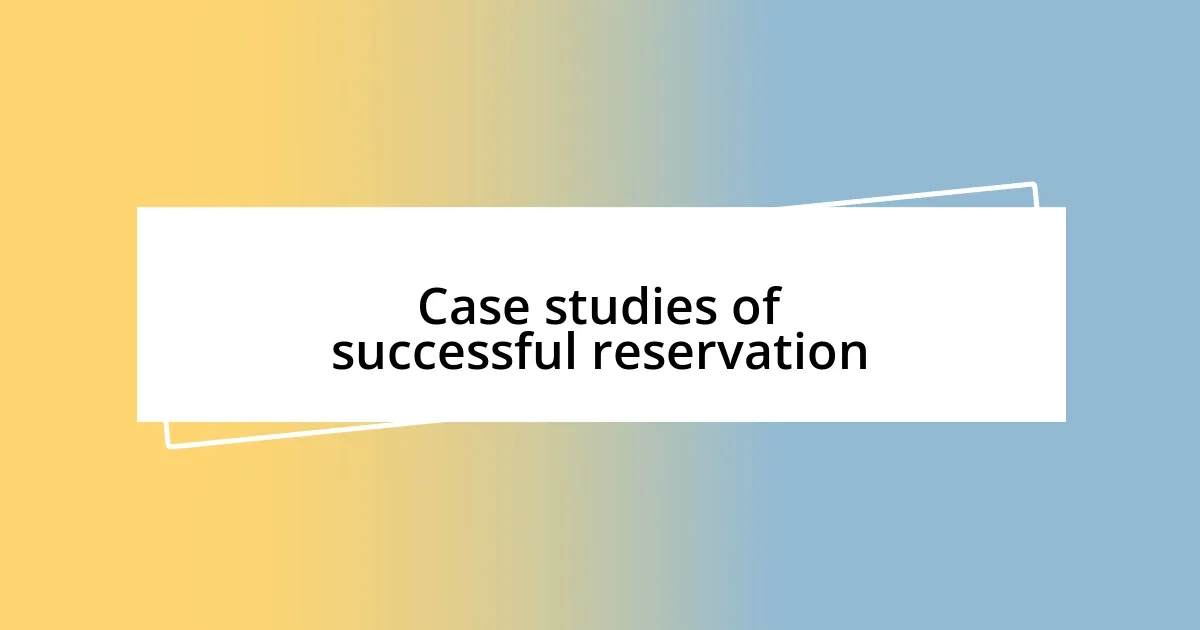
Case studies of successful reservation
One standout case I encountered was in a local university that implemented a robust reservation policy for its engineering program. During a campus event, I spoke with a young woman who was the first in her family to attend college. She credited the reservation policy with making that possible, noting how it opened doors not just for her, but for many like her, who historically faced barriers to higher education. Isn’t it inspiring to think about how one policy can ripple outward, impacting families and communities for generations?
In contrast, I remember a corporate firm that embraced reservation practices in their hiring process. They reported an unprecedented increase in innovation and diverse viewpoints, enriching company culture. A colleague once shared how her project team, made up of individuals from various backgrounds, brought together ideas that led to a breakthrough product. It made me reflect: how often do we underestimate what diverse teams can accomplish? This firm’s experience underscores the economic and creative advantages that come with thoughtful reservation policies.
Lastly, I couldn’t help but be moved by a nonprofit initiative that focused on reserving spots in vocational training for marginalized groups. When I attended their graduation ceremony, the pride on the faces of the graduates spoke volumes. Many of them had faced significant hurdles, yet here they were, equipped with skills and confidence to forge new paths in life. Isn’t it a reminder that these policies, while sometimes controversial, can empower individuals to rewrite their own narratives and uplift entire communities?
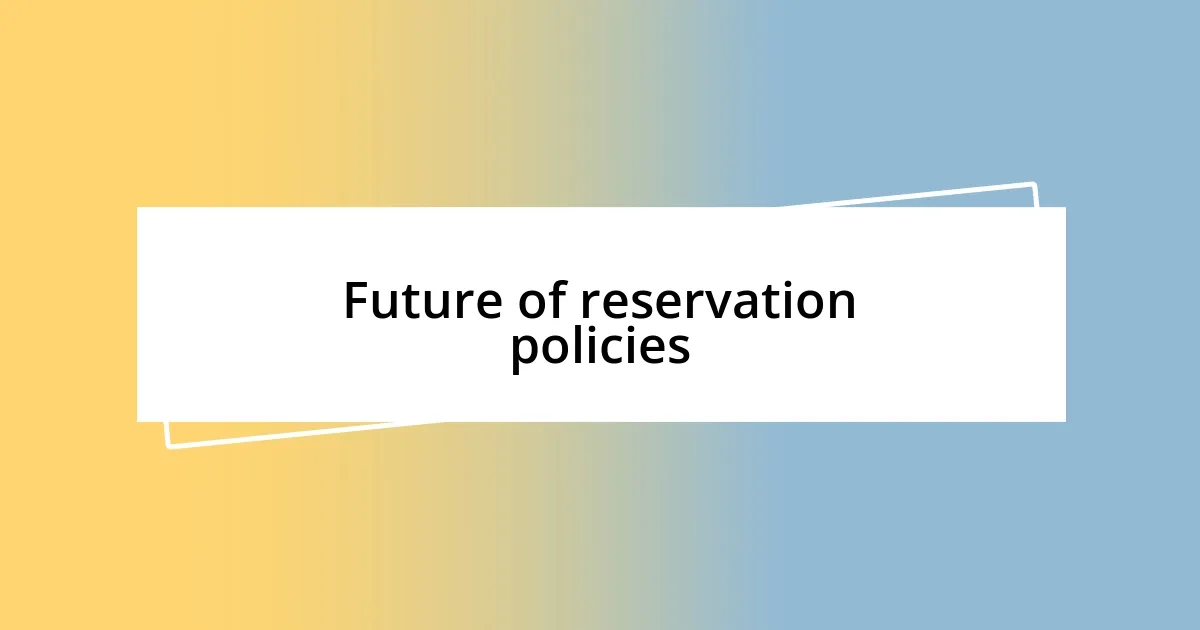
Future of reservation policies
As I think about the future of reservation policies, I can’t help but feel optimistic that we’re on the brink of transformation. I recently attended a seminar where experts discussed integrating technology into these policies. The idea of using data analytics to fine-tune direct support for underrepresented groups seemed innovative. Could this be a game-changer for ensuring fairness while minimizing disputes?
Looking ahead, collaboration among stakeholders will be crucial. I remember sitting in a meeting where educators, parents, and policymakers came together to brainstorm solutions. The energy in the room was palpable as we shared our insights and experiences. It made me wonder, what if communities actively participated in shaping these policies? Such an inclusive approach could not only ease tensions but also foster ownership and accountability.
Another trend I foresee is the growing emphasis on evolving metrics for success. I’ve often encountered frustrations with narrow definitions of achievement, which can overlook the true impact of reservation policies. If we could expand our parameters to include emotional well-being and community integration, wouldn’t that lead to a more holistic understanding of progress? We might find that success isn’t just about numbers but the stories behind them.
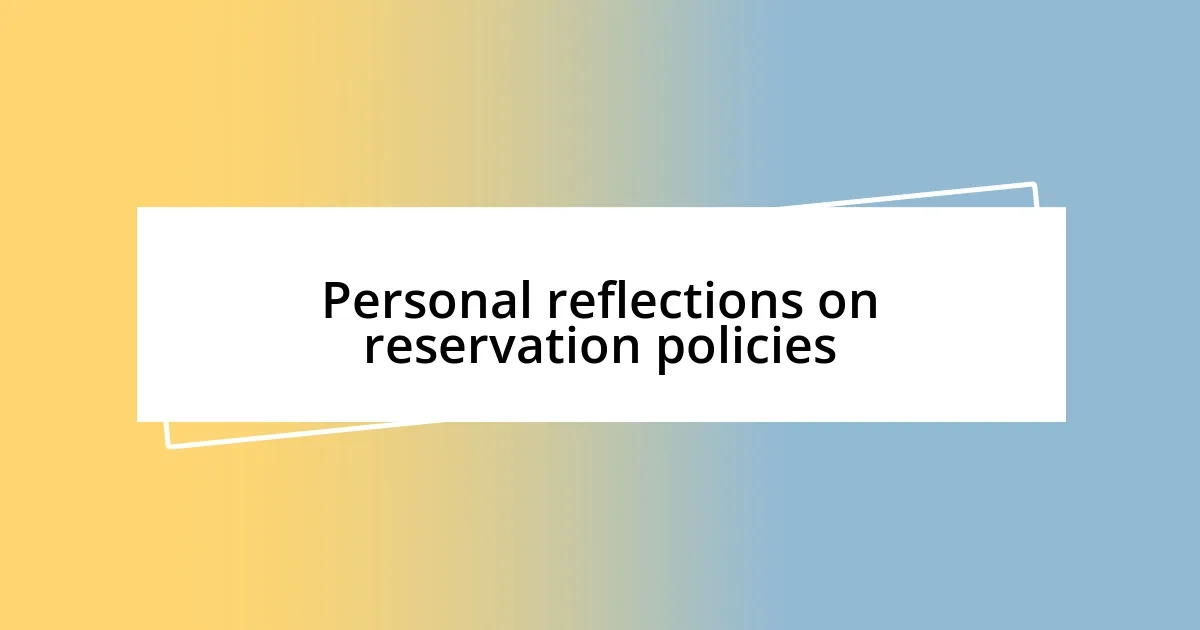
Personal reflections on reservation policies
When I reflect on reservation policies, I often find myself drawn to the emotional weight they carry. I once met a single mother working two jobs who was overjoyed when she learned her daughter qualified for a reservation that would allow her to attend a prestigious high school. That moment of hope reminded me how critical these policies can be in breaking cycles of poverty. Isn’t it incredible how just one opportunity can change a family’s trajectory?
I’ve also experienced the challenges these policies can create. A close friend of mine faced a tough decision regarding her own academic path after being given a reservation slot at a competitive university. She felt both grateful and guilty—grateful for the chance, yet uncertain if her merit alone would have secured her place. This made me question: how do we find the balance between fairness and opportunity? Addressing these feelings is essential for nurturing an environment where all voices are heard and valued.
In another instance, while volunteering at an organization supporting underprivileged youth, I witnessed firsthand the struggles and triumphs of those who benefited from reservation policies. I vividly remember a young man who, after being reserved a scholarship, shared how it fueled his ambition to pursue law. His passion was contagious, and it left me pondering how vital it is to share these stories. Aren’t these narratives the real testament to the power of reservation policies in reshaping lives and communities?





